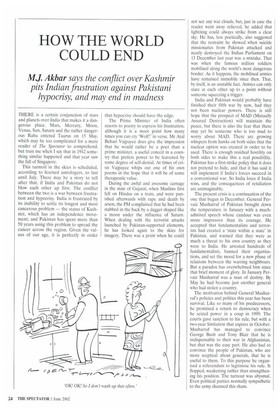HOW THE WORLD COULD END
Akbar says the conflict over Kashmir
pits Indian frustration against Pakistani hypocrisy, and may end in madness
THERE is a certain conjunction of stars and planets over India that makes it a dangerous place. Mars, Mercury, Moon, Venus, Sun, Saturn and the rather dangerous Rahu entered Taurus on 15 May, which may be too complicated for a mere reader of The Spectator to comprehend, but trust me when I say that in 1942 something similar happened and that year saw the fall of Singapore.
This turmoil in the skies is scheduled, according to learned astrologers, to last until July. There may be a story to tell after that, if India and Pakistan do not blow each other up first. The conflict between the two is a war between frustration and hypocrisy. India is frustrated by its inability to settle its longest and most cancerous problem — the status of Kashmir, which has an independence movement; and Pakistan has spent more than 50 years using this problem to spread the cancer across the region. Given the values of our age, it is perfectly in order that hypocrisy should have the edge.
The Prime Minister of India often resorts to poetry to express his frustration, although it is a moot point how many times you can cry 'Wolf!' in verse. Mr Atal Behari Vaj payee does give the impression that he would rather be a poet than a prime minister, a useful conceit in a country that prefers power to be leavened by some degree of self-denial. At times of crisis Vajpayee whips out one of his own poems in the hope that it will be of some therapeutic value.
During the awful and awesome carnage in the state of Gujarat, when Muslims first fell on Hindus on a train, and were punished afterwards with rape and death by arson, the PM complained that he had been stabbed in the back by a dagger shaped like a moon under the influence of Saturn. When dealing with the terrorist attacks launched by Pakistan-supported elements, he has looked again to the skies for imagery. There was a point when he could not see any war clouds, but, just in case the reader went away relieved, he added that lightning could always strike from a clear sky. He has, less poetically, also suggested that the restraint he showed when suicide missionaries from Pakistan attacked and nearly destroyed the Indian Parliament on 13 December last year was a mistake. That was when the famous million soldiers mobilised along the world's most dangerous border. As it happens, the mobilised armies have remained immobile since then. That, by itself, is an unstable fact. Armies can only stare at each other up to a point without someone squeezing a trigger.
India and Pakistan would probably have finished their fifth war by now, had they not been nuclear powers. There is still hope that the prospect of MAD (Mutually Assured Destruction) will maintain the peace, but there is also the fear that there may yet be someone who is too mad to worry about MAD. There are growing whispers from hawks on both sides that the nuclear option was created in order to be used. There is enough residual hostility on both sides to make this a real possibility. Pakistan has a first-strike policy that it does not pretend to hide, and that it has said it will implement if India's forces succeed in a conventional war. So India loses if India wins, and the consequences of retaliation are unimaginable.
The present crisis is a continuation of the one that began in December. General Pervaiz Musharraf of Pakistan brought down the temperature in January with a muchadmired speech whose candour was even more impressive than its courage. He accepted that fundamentalists and terrorists had created a 'state within a state' in Pakistan, and warned that they were as much a threat to his own country as they were to India. He arrested hundreds of fundamentalists, banned their organisations, and set the mood for a new phase of relations between the warring neighbours. But a paradox has overwhelmed him since that brief moment of glory. In January Pervaiz Musharraf was a man of destiny. By May he had become just another general who had stolen a country.
The motivation behind General Musharrafs policies and politics this year has been survival. Like so many of his predecessors, he promised a return to democracy when he seized power in a coup in 1999. The courts gave sanction to his rule, but with a two-year limitation that expires in October. Musharraf has managed to convince George Bush and Tony Blair that he is indispensable to their war in Afghanistan, but that was the easy part. He also had to convince the people of Pakistan, who are more sceptical about generals, that he is useful to them. To this purpose he organised a referendum to legitimise his rule. It flopped, weakening rather than strengthening his position. The turnout was abysmal. Even political parties normally sympathetic to the army shunned this sham. Perhaps the most remarkable aspect of General Musharrafs much-awaited speech on Monday was the time he took to apologise to his country for this sham. He was defensive and looked wounded. When he switched to belligerence against India, it was more shrill than powerful. At times he chose to make debating points like an ebbing politician. And you don't have to go on national television to repeat what you tell your cronies over breakfast. The flat denial of any Pakistani support for terrorists in India was just that — flat. He reiterated Pakistan's support for Kashmiri separatism, and vowed that every Pakistani would become a holy warrior if India attacked. He did not mention nuclear weapons, but his fellow-generals have not been slow in their promise to blow everything into a cloud if war comes. The General ended his speech on a plaintive note. 'You have always shown faith in me.' he told Pakistanis. 'Show faith in me in this crisis, too.'
Always? How long is always? A question frames the dilemma faced by the dictatorgenerals of Pakistan: if you do not represent the people, then what do you represent? What is your rationale for seizing and then holding on to power? Patriotism becomes the first refuge of the general. And patriotism is synonymous with confrontation against India. This time around, the generals of Islamabad have some help from the hawks flapping at the outer reaches of the ruling BJP in Delhi. These hardliners have taken control of the agenda ever since they cowed the Prime Minister over Gujarat and prevented him from changing the chief minister Narendra Modi who was widely accused of fomenting the riots against the Muslims. Mr Vajpayee may have thought then that he was taking one step back in order to move two forwards. but he has been trapped.
The world would probably not bother too much if India and Pakistan destroyed each other, provided they did not also threaten to contaminate the oil-rich world around them. In the past the world has waited for the two countries to exhaust their ammunition and see sense, but the first sign of nuclear war came in 1999 when Bill Clinton had to inform the then Pakistani prime minister Nawaz Sharif that some generals were planning a nuclear attack on India during the brief but intense conflict over Kargil. Sharif stopped the fighting and ordered Pakistani infiltrators to return home. One of the chief architects of that war was Pervaiz Musharraf.
Russia has asked India and Pakistan to meet and talk, with help from Vladimir Putin if necessary, at a conference that both will attend in central Asia next week. It is safe to assume that the antagonists will wait for this conference before they do anything dramatic. Relief comes a week at a time on the subcontinent.
Much to my dismay, I cannot blame the British for our ills this time around. There is no divide-and-rule policy to hang out as an excuse for our murderous — or suicidal — tendencies. But I do blame the British for one thing. They could have taught us football rather than cricket. While the rest of the world is exhilarated by a festival of football this month, India and Pakistan talk of nuclear war. Would we have gone to war if we had qualified for the World Cup? Maybe Britain can still do something useful. Instead of sending Jack Straw to the subcontinent, it could send David Beckham. He would certainly have a better chance of reaching a goal.
Akbar is the author of The Shade of Swords: Jihad and the Conflict Between Islam and Christianity, published by Routledge at f16.99.







































































 Previous page
Previous page